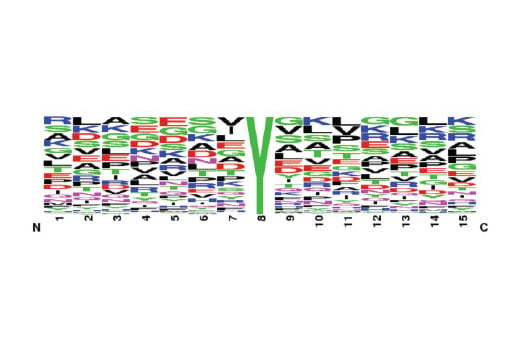 全部商品分类
全部商品分类



 下载产品说明书
下载产品说明书 下载SDS
下载SDS 用小程序,查商品更便捷
用小程序,查商品更便捷


 收藏
收藏
 对比
对比 咨询
咨询PTMScan® Technology employs a proprietary methodology from Cell Signaling Technology (CST) for peptide enrichment by immunoprecipitation using a specific bead-conjugated antibody in conjunction with liquid chromatography (LC) tandem mass spectrometry (MS/MS) for quantitative profiling of post-translational modification (PTM) sites in cellular proteins. These include phosphorylation (PhosphoScan®), ubiquitination (UbiScan®), acetylation (AcetylScan®), and methylation (MethylScan®), among others. PTMScan® Technology enables researchers to isolate, identify, and quantitate large numbers of post-translationally modified cellular peptides with a high degree of specificity and sensitivity, providing a global overview of PTMs in cell and tissue samples without preconceived biases about where these modified sites occur (1). For more information on PTMScan® Proteomics Services, please visit www.cellsignal.com/common/content/content.jsp?id=ptmscan-services.

Product Usage Information
Cells are lysed in a urea-containing buffer, cellular proteins are digested by proteases, and the resulting peptides are purified by reversed-phase solid-phase extraction. Peptides are then subjected to immunoaffinity purification using a PTMScan® Motif Antibody conjugated to protein A agarose beads. Unbound peptides are removed through washing, and the captured PTM-containing peptides are eluted with dilute acid. Reversed-phase purification is performed on microtips to desalt and separate peptides from antibody prior to concentrating the enriched peptides for LC-MS/MS analysis. CST recommends the use of PTMScan® IAP Buffer #9993 included in the kit.
PTMScan® Phospho-Tyrosine (P-Tyr-1000) Kit has a higher sensitivity and specificity magnetic bead version: PTMScan® HS Phospho-Tyrosine (P-Tyr-1000) kit in 10-assay (#38572) or 3-assay (#29879) formats.



Antibody beads supplied in IAP buffer containing 50% glycerol. Store at -20°C. Do not aliquot the antibody.
参考图片
Motif analysis was done using all tyrosine phosphopeptides generated from a PhosphoScan® experiment of mouse brain and mouse liver tryptic peptides using PTMScan® Phospho-Tyrosine Motif (Y*) (P-Tyr-1000) Immunoaffinity Beads. The Motif Logo, drawn from 1178 nonredundant sites, shows the amino acid distributions around the sites recognized by Phospho-Tyrosine (P-Tyr-1000) Rabbit mAb #8954. The motif logo shows that this antibody is a general phospho-tyrosine antibody and does not have amino acid preferences at other positions.
Representative motif analysis of 2362 phospho-tyrosine tryptic peptides generated from a PhosphoScan® experiment of Jurkat cells treated with Calyculin A #9902 and pervanadate using PTMScan® Phospho-Tyrosine Motif (Y*) (P-Tyr-1000) Immunoaffinity Beads. Motif logo was generated using the PhosphoSitePlus® Logo Generator and reflects relative frequency of residues in each position. For more information, please visit PhosphoSitePlus® at www.phosphosite.org.




